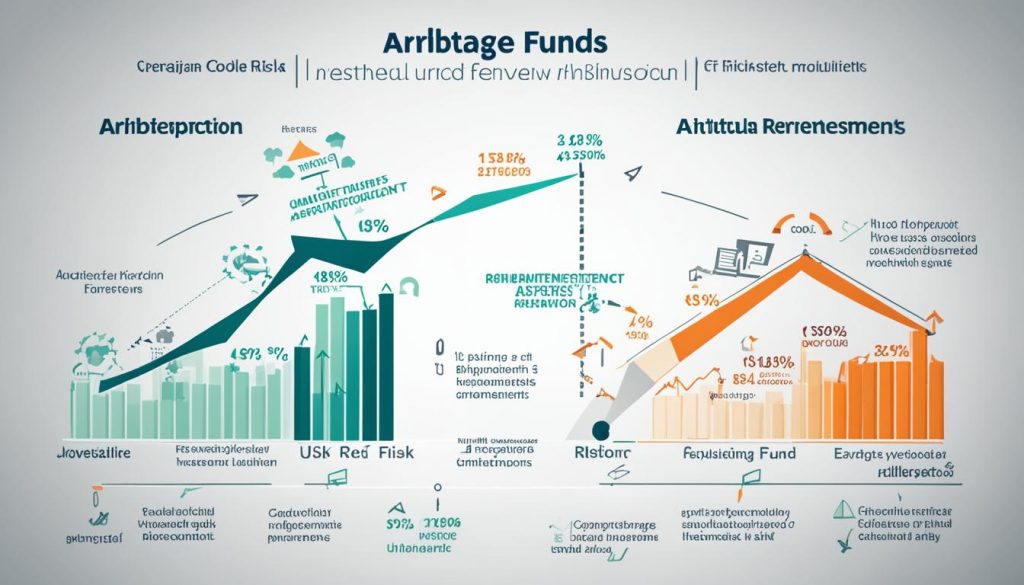Arbitrage mutual funds make money from price differences in various markets. They use the gap between cash and futures markets. This is done through complicated methods and smart moves. Fund managers play a key role in managing these strategies. They aim to keep risks low and take advantage of buying and selling at the right times. The main goal is to earn steady money, even when markets change.
Key Takeaways
- Arbitrage mutual funds exploit pricing inefficiencies between markets.
- These funds aim to generate returns through price differentials.
- Skilled fund managers execute complex strategies to mitigate risks.
- Designed to offer stable returns in diverse market conditions.
- The funds capitalize on balanced buy-sell positions.
What Are Arbitrage Mutual Funds?
Arbitrage mutual funds aim to profit from price differences in various markets. They focus especially on the cash and futures markets of the same asset. To fully understand them, knowing about arbitrage and mutual funds is key.
Understanding Arbitrage
Arbitrage is about making a profit without risk from differing prices in separate markets. You buy and sell an asset in different places where the prices don’t match. The money you make comes from the price differences.
Overview of Mutual Funds
Mutual funds collect cash from many people to invest in a mix of securities. These funds have expert managers. They aim for large-scale benefits and variety, which might be hard for solo investors. This allows investors to get into wider markets and lower their risks, unlike trading on their own.
| Aspects | Arbitrage Mutual Funds | Traditional Mutual Funds |
|---|---|---|
| Goal | Exploit pricing inefficiencies | Achieve growth through diversified investments |
| Market Focus | Cash and futures markets | Primarily equity or bonds |
| Risk Level | Generally low due to hedging | Varies depending on the type of fund |
| Management | Highly active, requires expert fund managers | Can be actively or passively managed |
Knowing how arbitrage mutual funds work lets investors see the smart tactics involved. Arbitrage funds aim for risk-free earnings from price gaps. Meanwhile, mutual funds offer a way for investors to put money together for wider market access and lower risks. Each serves unique but supportive roles for investors.
How Do Arbitrage Mutual Funds Work?
Arbitrage mutual funds make money from price differences in different markets. They offer a unique edge in investment portfolios. By understanding them, you can see their benefits.
Mechanics of Arbitrage
The strategy behind arbitrage mutual funds is simple. They buy low in one market and sell high in another. This way, they make quick profits. These funds mainly work in equity markets, tapping into the fleeting mispricing of stocks.
For those investing in arbitrage mutual funds, know it’s a fast-paced world. Deals must be made quickly to catch the price gaps. Success relies on the fast spotting of these chances.
The Role of Fund Managers
Fund managers are key to arbitrage mutual funds’ success. They use deep market insights, smart algorithms, and sharp trading skills. This helps them find and act on arbitrage opportunities fast.
Aside from finding opportunities, fund managers handle risks to maximize gains. They keep a close eye on market trends and adjust strategies accordingly. This ensures a lead in the competitive market.
Benefits of Arbitrage Mutual Funds
Arbitrage mutual funds offer many benefits, making them great for investors. They use special strategies that differ from regular equity funds. This makes them stand out.
Risk Mitigation
Arbitrage mutual funds are great at reducing risk. They use hedging to balance buys and sells. This lowers potential losses. Even when markets are unstable, these funds stay safer. They’re good for cautious investors.
Potential for Steady Returns
These funds can also provide steady earnings. They’re less affected by market ups and downs compared to regular equity funds. This is especially helpful in tough market times. It adds a level of safety and consistency.
They’re also good for diversifying your portfolio. The strategies they use and their lower volatility are beneficial. They serve as a conservative option for investors. Those who seek safety and risk control might find them attractive.
To sum up, arbitrage mutual funds are ideal for those cautious about risk. They balance your portfolio while managing risk well. They’re a wise choice for those wanting to grow their investments safely.
Risks Associated with Arbitrage Mutual Funds
Arbitrage mutual funds are generally seen as low-risk. But they do carry some inherent risks. It’s key for investors to understand these risks to make wise choices.
Market Risks
Market risks come into play when the prices expected to converge, don’t. This can wipe out potential profits. Even if arbitrage usually has low market fluctuation exposure, prices sometimes fail to meet. This can reduce the gains you were hoping for and affect the fund’s success.
Liquidity Risks
Liquidity risks are a big deal for arbitrage mutual funds. They happen when funds can’t make trades fast enough to capture arbitrage chances. This is often because the market isn’t deep enough or changes too quickly. If the market lacks liquidity, funds may have to hold assets longer than they wanted. This could lead to lower returns or even losses.
| Risk Type | Description | Impact on Fund |
|---|---|---|
| Market Risks | Occurs when expected price convergence does not happen. | Reduces or eliminates anticipated profits. |
| Liquidity Risks | Inadequate market depth or rapid market changes. | Delays in trade execution, possibly resulting in losses. |
Examples of Arbitrage Mutual Funds
Arbitrage mutual funds let investors use unique tactics to cut risks and raise returns. They do this by taking advantage of market gaps. Some funds are known for their success and strong results. These examples show how effective and flexible they are in different market situations.
Fund Performance
To judge arbitrage mutual funds, look at metrics like their risk-adjusted returns. You should also look at their consistency and how they compare to benchmarks. Here’s a closer look at some top arbitrage mutual funds and their performance:
| Fund Name | 1-Year Return | 3-Year Return | 5-Year Return | Standard Deviation |
|---|---|---|---|---|
| Invesco India Arbitrage Fund | 4.5% | 5.2% | 5.8% | 0.6% |
| Edelweiss Arbitrage Fund | 4.2% | 5.1% | 5.6% | 0.7% |
| Aditya Birla Sun Life Arbitrage Fund | 4.4% | 5.4% | 5.9% | 0.5% |
Case Studies
Case studies show how arbitrage mutual funds adjust to market changes. For example, they profit from price differences during mergers. And they quickly change their positions when economic policies change. This way, they keep making money.
Looking at their performance and analyses helps us understand their strategies. It shows why they are reliable in both steady and unpredictable markets. If you want a mix of safety and profit, look at these funds. You’ll see the strategies behind their success.
Conclusion
Arbitrage mutual funds aim to make money by taking advantage of market inefficiencies. They offer a way to balance potential profits against lower risks. By learning what arbitrage mutual funds mean and their definition, investors see how these funds use price differences. These differences are between cash and futures markets to their advantage.
The good thing about arbitrage mutual funds is they reduce risk and bring steady profits. This makes them a good choice for a well-rounded investment portfolio.
However, it’s important to know the risks of arbitrage mutual funds, like market and liquidity risks. These risks can impact how much money you make. Investing in arbitrage mutual funds means understanding these risks well. And, you must think about the market conditions carefully.
Case studies and examples show how arbitrage mutual funds have done in various economic situations. This helps illustrate their strategy and give investors helpful insights.
This article pulls together advice from financial experts to clear up how arbitrage mutual funds work. For those looking to make their investment mix more steady, these funds are important. Knowing how to use the benefits of arbitrage mutual funds can make your investment strategy better. It helps you keep up as the market changes.
FAQ
What is the meaning of arbitrage mutual funds?
Arbitrage mutual funds find price differences in markets to help investors make money. They look for differences between the cash and futures markets. Fund managers use complex strategies to do this.
How do arbitrage mutual funds work?
These funds buy a security in one market and sell it at a higher price in another. They focus on finding small price differences in stocks. To do this, fund managers analyze market data and use special algorithms.
What are the benefits of investing in arbitrage mutual funds?
Investing in these funds can reduce risk and offer steady returns, no matter the market trend. They’re less risky than traditional stock funds. This makes them a good choice for cautious investors.
What are the risks associated with arbitrage mutual funds?
There’s a risk that prices may level out, removing profit chances. Sometimes, it can be hard to make trades quickly because of market conditions. Even though these funds aim to be low-risk, they’re not totally without risk.
Can you provide examples of arbitrage mutual funds?
Sure, there are funds with good historical performance. Looking at their past successes gives insights into their stability and strategy.
How does the role of fund managers impact arbitrage mutual funds?
Fund managers are crucial. They use data, algorithms, and trading strategies to find and act on arbitrage opportunities quickly. Their expertise is essential for the fund’s performance.
Why should an investor consider arbitrage mutual funds?
They’re appealing for their potential for steady earnings and lower risk. They provide a way to diversify investments. This is especially attractive to those cautious about risk.






